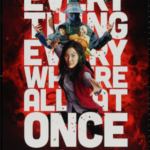Don’t Look Up (2021)
Today’s guest review is by Justin Petrisek.
One of my favorite bits of trivia is that Aldous Huxley, JFK, and C.S. Lewis all died on the same day – November 22, 1963.
Of course, the assassination of President John F. Kennedy is what most people remember, but losing three prominent political, philosophical, and theological minds within just a few hours of each other is intriguing. So intriguing, in fact, that philosopher Peter Kreeft wrote a book about it (Between Heaven and Hell) in which the three men meet in the afterlife to discuss their views of the world, society, faith, politics, and morality.
The imaginative thought experiment makes for dramatic and fascinating conversation, combining Huxley’s Brave New World-inspired satirical outlook, Kennedy’s humanist politics and media savvy, and Lewis’s incisive barbs about society, morality, and the meaning of life.
Adam McKay’s satirical comedy Don’t Look Up makes a similar attempt at combining the political, philosophical, and ethical threads that continue to dominate our society. I’m not saying it works – the famed director of Step Brothers, Anchorman, Talladega Nights, and The Big Short has largely made his name with Will Ferrell as his front man and on-screen muse.
McKay’s ventures into satire and politics, including his 2018 political satire Vice about former U.S. Vice President Dick Cheney, have been largely divisive – about as divisive as the politics they portray. The humor that anchors his earlier work becomes far less entertaining when channeled into a satirical framework.
The problem with writing satire is that you often end up poking fun at yourself as much as you do the thing you are satirizing. And, at times, it turns into more than just making fun of yourself. You can actually start to create arguments against yourself, poking holes in your own logic and displaying your own incoherence.
Don’t Look Up is precisely that: incoherent. However, it’s not entirely the film’s fault, and the film is not without insight. McKay has set out to satirize a modern political and media landscape that is for the most part incoherent, and at best frustrating. And so begins a vicious circle: a dark comedy that reflects the frustrations of both media and politics, yet cannot move beyond its own annoyance.
The set-up is simple. Two astronomers at a Michigan observatory discover a comet with a trajectory heading straight for Earth. After President Janie Orlean (Meryl Streep) meets their discovery with indifference and refuses to act on the information, Dr. Randall Mindy (Leonardo DiCaprio) and Kate Dibiasky (Jennifer Lawrence) go on a media tour to try and convince the public that civilization is going to be destroyed.

The two scientists are met with continual frustration as their pleas fall on deaf ears. Politicians only want to help insomuch as it aids their re-electability or satisfies their voting blocs. Media pundits either ignore the story because of the political baggage it carries or opt for non-confrontational content that gives them increased viewership (such as Ariana Grande, playing a fictionalized version of herself, getting back together with her famous boyfriend DJ Chello, played by Kid Cudi, while on live television). From top to bottom, people either fall apart ranting about the impending destruction of the planet or ignore the fact that a comet is heading straight for Earth. The latter group eventually has their stance concretized into a slogan (Don’t look up!”) which immediately becomes politicized.
In the aftermath of the film, much of the discourse revolved around the comet as an allegory for climate change. But the allegory is probably the least interesting part of this movie. What is more intriguing is the way in which the film tries to embody our current frustrations with the media and politics.
Our current media landscape is less concerned about truth and often more concerned about political correctness, catering to a particular audience, or prioritizing viewership over ethical journalism. While the combination of cynicism and satire is pandering (little surprise that this film is made by a liberal mind for a liberal audience), it still reveals many frustrations with our current society and the direction that we are heading.
The refusal to confront truth and scientific fact can be seen by both sides of the aisle. Left-leaning viewers may resonate with how the film portrays those who refuse to engage with climate change as the highest political priority, while right-leaning viewers might see the same and think “but how can people reject the scientific facts about when life begins?”
In fact, it doesn’t take much imagination to replace the “political football” in this movie with a right-leaning or pro-life issue and end up with the same results – an incredibly divisive film where one political ideology sees their frustrations conveyed on screen while the other is left flabbergasted by people ignoring what they perceive to be the greater issue. Can society ever agree on a “greatest issue”? While the film doesn’t set out to answer that question, it does demonstrate why certain solutions may be wrong.
There is an obvious Trumpian quality (or at least perception) behind Streep’s portrayal of President Orleans. But the film quickly shows that politicians and politics are the wrong place to look to for answers regardless of party affiliation. The only ones who seem capable of making a difference are the ones appealing to the politicians, the ones on the ground who are confronted by life’s problems on a daily basis.
Another character who seeks to provide solutions is Peter Isherwell (hilariously portrayed by Mark Rylance). Isherwell emerges from the same vein as the gaggle of “genius billionaires” that populate current Twitter discourse and media (e.g., Mark Zuckerberg, Elon Musk, Jeff Bezos, etc.). And at first, he seems convincing and willing to spend his money for the betterment of humanity. How quickly we know that will not be the case. Isherwell uses his wealth to make President Orleans his puppet, and, in the end, his genius and ethical outlook are empty – his care for the individual human person is a façade.

In fact, the most genuine character in the film is not a billionaire, politician, or seemingly anyone who can make a difference in stopping the comet from hitting Earth. The most genuine and redeeming character seems to be the young punk Yule played by Timothée Chalamet. He is not taken in by the media or politics and, when confronted by the reality of the comet, is actually compelled to pray.
Is this a positive that could come from the media-saturated and politically frustrated society that we are living in? Are we becoming so extreme that the next generation will find religion, ethics, and morality far more agreeable than its predecessors? One can hope that our future will not be determined by political buzz words or empty promises from billionaires. Maybe we can hope that those on the ground, those faced daily with the problems of life and the value of human life, are the ones we can look to.
The final and lasting indictment of the film is not about climate change or political ideologies. We are watching a version of our society not heading for annihilation, but self-immolation. We are in a vicious circle. We are a snake eating its own tail. And the cycle must be broken.
Don’t Look Up is ultimately about people whose minds are already made up and the rare few who refuse to have their minds made up for them. Almost no one sways or changes their mind in Don’t Look Up. All the characters are stuck in limbo – just like Lewis, Huxley, and Kennedy – endlessly having the same conversation. We must look to those who are dissatisfied with the current state of the conversation. Perhaps they are the ones who can see where we need to go next.
Don’t Look Up is directed and written by Adam McKay. The film has an MPAA rating of R for language throughout, some sexual content, graphic nudity, and drug content.
Justin Petrisek is a writer from Virginia. He received his M.F.A. in creative writing and M.A. in literature from George Mason University as well as an M.A. in theology from the Augustine Institute.













